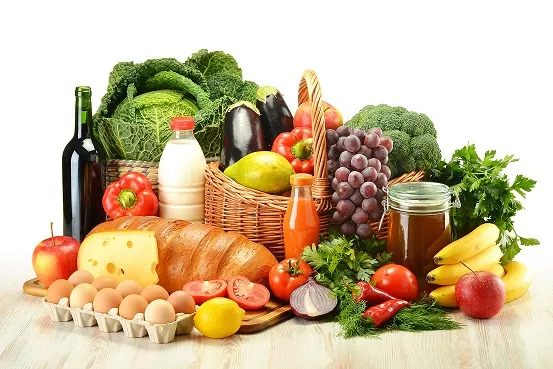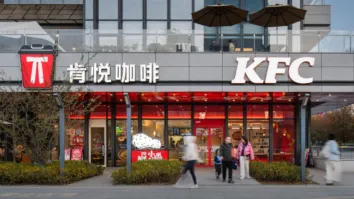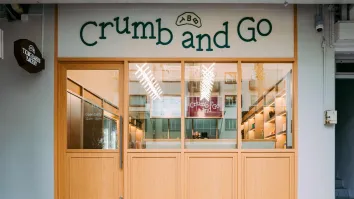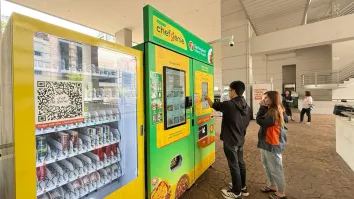
Can the Singapore food industry keep up with organic food’s blossoming popularity?
Limited land area could lead to sky-high costs.
Organic food has steadily been creeping its way into the Singaporeans’ diets, with more and more supermarkets and restaurants jumping on the bandwagon in recent years. However, the cost of organic produce in a city-state with limited agricultural lands may take a toll on the local foodservice industry.
Here’s what local food operators have to say:
Stephanie Hancock, Director, Wild Honey
I think there is a broader trend that includes organic foods but goes beyond that. I see a real interest and desire for food that is not only healthy but also fresh, real, sustainable and raw. Also hormone and antibiotic free—fresh food that can be traced back to its source. And of course organic foods are included in this. Think about the farmer’s markets in Italy, France, England, the US and Australia. We’re even starting to see this a little bit in Singapore with hotels or restaurants growing their own herbs or Open Farm Community growing much of their own produce however this is out of reach for most enterprises due to the urban scape. People want to know there food comes for a good source, and that it will be safe and healthy for everyone to eat.
There is a tremendous amount of opportunity in QSRs to offer people food that is as fresh and whole as possible, to ensure the raw materials sourced have integrity and that they are cooked and prepared in a way which are healthy. There are lots of opportunity for QSRs to tap into these trends with a range of fresh, raw products that will attract new users and interest in your restaurants. It’s a fantastic opportunity for wonderful creativity around the dishes you offer.
Obviously, Singapore is lacking an agricultural base so it is much harder to deliver the ideal of farm to table and organic produce on a large scale. Sadly, the cost of organic produce is very high and out of reach of most families, as most of it is imported and there is a premium attached to the production of organic foods. I am encouraged however to see the organic sections in the supermarkets expanding which means there is a demand and growing awareness about the effects of pesticides and herbicides. The downside, of course, is the cost to the consumer.
Emma Heap, Managing Director, foodpanda Singapore
To be the leaders in the food delivery industry we need constant technological and social innovation as the needs and habits of the millennial consumer are constantly evolving. We have already responded to consumer demand for healthier options, and faster delivery times and we believe both trends will continue this year. Along with the healthier dishes on offer, we’re looking at even smarter ways to improve the offerings and service to the customers.
foodpanda is a response to the Millennial consumer who wants to be able to access great food using familiar technology, i.e. their smartphone or website. The industry is moving rapidly.We have seen a move towards healthier and more wholesome choices and we expect this to continue. In response to this we have partnered with healthy and gourmet vendors such as Eight Treasures, Salad Stop! and Sumo Salad. Restaurants are also more health conscious and want to make sure that their food is sourced responsibly.
2015 was a year of investment in technology, operations and customer experience for foodpanda. foodpanda is a technology first company. We are constantly optimising both our systems and technology to provide the best customer experience; bringing convenience and variety to customers whether they are busy in the office, or relaxing at home.
foodpanda’s smart order dispatching selects the best positioned driver which then allows them to be in close proximity to the restaurant and the consumer so food can now be delivered in just 30 minutes.
We are seeing lots of traditional industries move into the digital domain such as groceries, laundry, taxis etc. The food delivery industry isn’t new, but the online response is growing rapidly.
For global business growth, we focus on the markets we are already in and since 95% of food ordering is still offline, this is where huge growth potential still is. Food delivery is one of fastest growing and biggest potentials in internet businesses.
We are part of the online revolution and like many industries, F&B is moving rapidly. To survive companies need to be nimble, invest in technology and move fast. As such foodpanda invests in R&D and many new developments are coming soon; improved order tracking for example.
As technological investments enable food delivery to become even more convenient, we see changing consumer behaviour to reflect this. Back in 2012 food ordering was for special occasions and events. Now we see people ordering from the office, for a date night, treating their family, for corporate events as well as special occasions.
Tai Seng Yee, Executive Director, Zenxin Agri-Organic Food Pte Ltd
It is a fact that the organic food movement is still centred around the home at the moment, and organic dining is still a niche market. As consumers today are more appreciative of the benefits of organic food, they will naturally wish to have Clean Eating via the organic option even when they dine out. Positioned at the more accessible end of the food service industry, quick service or fast casual dining outlets may want to ride on this trend to cater to these demands. They may want to look into offering affordable, interesting dishes using some organic ingredients which are not pricey. They may also want to revise their recipes and explore what are the best ways to preserve all the benefits of organic food in their dishes. Some fast food chains are already redesigning themselves as boutique cafes with more healthier options that offer organic, wholesome food.
Restaurants can explore new recipes that will maximise the benefits of organic food while providing the best taste experience. For example, vegetables can be cooked in lower heat or exposed to high heat for a shorter period of time to retain the essential vitamins and nutrients, while adding an extra crunch to the texture and preserving the fresh-green appearance. When consumers are able to enjoy familiar dishes presented with a new twist and better health benefits, they will be more willing to patronise the restaurant. This way, the restaurant will also build up its brand image as a wholesome eatery that provides better food.Another recent trend is eating local, as strongly advocated by organic agriculture. Foodservice industry should look into ways of embracing local produce in their menus which are appealing to the consumers’ palate.
Consumers today are concerned about the source of produce and the processes involving in producing them. Having the ability to trace from the packaging back to the farm where the produce is grown will certainly help to instil consumer confidence in our products. At Zenxin, we keep a rigorous record of which parts of the earth produce the best produce, and we are able to source from them and sustain these produce in their freshest state.
Pricing is the first challenge that comes to mind. Even though the general public is now more informed about the benefits of organic food, consumers are still price sensitive. In its early days, organic produce was substantially pricier. So even till this day, consumers have this impression that "organic means more expensive". The fact is most organic food prices have maintained for past years, thanks to Zenxin's effort in providing guarantee purchases of organic produce from our contract farmers. But it will take some time to change the consumers mindset. Business owners who choose to go the organic route will therefore need to be mindful of this bias. They may want to avoid over-selling on the ‘organic’ brand, but instead emphasise on value while keeping their prices affordable.
Norman Cross, Executive Assistant Manager-Food and Beverage, Ramada and Days Hotels Singapore At Zhongshan Park
Generally, in Singapore, I believe that the organic food trend is heading in a positive direction, albeit a little slower as compared with other regions. Consumers are getting savvier with more unique food and beverage concepts and offerings sprouting out here and around the region. We are starting to see over the last few years, consumers are increasingly more influenced by their diets, and the health benefits of organic food produce. The media also had a large part to play in terms of educating consumers in their food choices. Furthermore, with travel being so affordable these days, people travel more often and get a feel of how organic produce is used so widely in other markets as part of a normal daily diet, and come back with a better acceptance and understanding of organic produce.
Furthermore, primarily in the QSR industry, which has for the longest time been viewed by the general public as being an ‘unhealthy’ dining option although this may not be the necessary case. In recent times, we have seen certain players in the QSR industry feature more organic items on their menu offerings taking into consideration the health benefits being more prominently displayed through effective marketing channels. With regard to full service hotels/restaurants which is the segment I represent, we are seeing more of our guests be it overseas travellers or local residents requesting for organic produce to be featured in our a la carte menus and buffet selections. My chefs work closely with our curated suppliers to source for these items taking into consideration price, source of produce and affordability of infusing organic produce into our menus vs. non-organic items, without affecting quality and taste.
As what I mentioned earlier, although there is an increasingly stronger demand for organic food, it has not reached the stage where it is necessary to infuse that in menus. However, opportunities arise from not only restaurant Chefs, R&D teams but also from suppliers to work closely together to package organic food as a mainstream food item. This drives creativity within the kitchens, marketers and business owners to let consumers understand that organic food is here to stay and not just be another food fad, waiting to just dissipate once the trend wears off. This in turn enhances the customers’ overall dining experience, and can potentially lead to new exciting QSR or full serviced concepts being introduced into the market
In my opinion, I would say two predominant challenges and they are as follows:
1. Affordability would be a challenge for the fast food market. The fast food industry is largely price sensitive due to a predominantly lower average consumer spend vs. full serviced restaurants. Hence, with the increased use of organic produce, there would be a potential increase in production cost not only in part to the relatively lower shelf life as they usually don’t last as long as non-organic produce due to the lack of preservatives, which would lead to higher priced items, and that could turn out to be sensitive to diners in this segment.
2. Secondly, educating the general public on the benefits of consuming organic produce is another major challenge. A large part of the dining market today is based on taste, food presentation/packaging, price and not necessarily on health benefits. This is not only relevant for the fast food industry, but for the whole F&B consumer industry in general. Getting the message across that taste, price, affordability packaged together as a value-driven proposition is time consuming and requires all facets of the supply chain leading up to the consumer, to believe and work towards getting the correct message across. This cannot work with just the vendor communicating that message across to the consumer as It simply is not strong enough to convert general diners to organic food advocates. The necessary regulatory statutory boards can also play a part in driving that message across to the general public.
Randy Torres, Brand Chef, Refinery Concepts
I have lived in Singapore for the last 6 years and am currently a brand chef of The Marmalade Pantry, two outlets and one opening in late march, and Oriole Cafe, two outlets. I was in Texas, USA before this working in the F&B for many years and one of my employers was Whole Foods Market. The organic food impact that I saw in the sates was very influential but as compared to Singapore, I feel like its has just recently hit. I find, personally, that their is more of a health conscious trend where lots of local cliential are more aware and looking for more healthy foods. Because produce is so expensive already, since most of it is imported due to lack of natural resources, organic food is very pricing and unaffordable for the local quick service and fast casual industry.
I have seen a major impact of healthy conscious eaters, for example one of the brands that my company runs is Dean N Deluca is following a similar concept that a restaurant named Grain Traders is doing which is offering a variety of fibrous salads using various grains, complex carbohydrates(i.e. buckwheat noodles, whole meal pasta) & more fresh produce.
The biggest challenge for Singapore F&B industry and fast food included, I feel will be price of organic food. Since there is little land in Singapore for agriculture, mostly likely it will be done elsewhere and the price to maintain the food quality and authenticity will be much higher that what is current being done. I do feel that the seed has been planted for the benefits of eating healthier. If the awareness of the benefits of organic consumption continues like it has, sooner or later they will more opportunities.





















